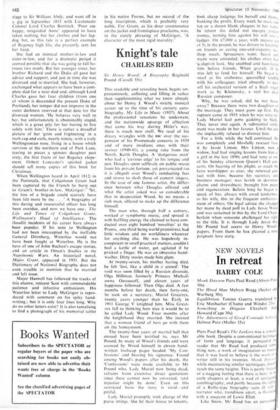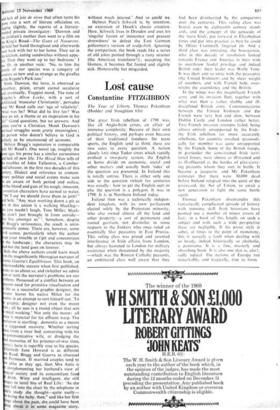NEW NOVELS
In retreat
BARRY COLE
Monk Dawson Piers Paul Read Alison 1' 30s) The Hired Man Melvyn Bragg (Seeker Warburg 30s) Equilibrium Tonino Guerra translated Eric Mosbacher (Chatto and Windus 21' Something in Disguise Elizabeth 1, - Howard (Cape 30s)
The Adventures of Good Comrade Sell Helmut Putz (Muller 35s)
Piers Paul Read's The Junkers was a remark- able book. Despite a conventional technto of form and language, it persuaded the reader that Mr Read had produced some thing new, a work of imagination so matu that it was hard to believe it the work of writer still in his twenties. Monk ()all' while maintaining similar techniques. &- reach the same heights. This is partly of a nagging feeling that there is hen.. early chapters at least, a wad of undlgt, autobiography, and partly because the lel of a Rolfe-type biography suits ill x% it; narrator who, trendiness apart, is flavou with a soupcon of Lewis Eliot.
-Like Snow, Mr Read has an earnest!!
EA lack of joie de vivre that often turns his prose into a sort of literate officialese or, !aping slightly, the reports of a literary- minded private investigator: 'Dawson and the children's mother then went to a film on the King's Road—The Guns of Navarone. Beheld her hand throughout and afterwards Ent back with her to her home. They sat in the kitchen, eating sandwiches without appe- tite. Then they went up to her bedroom.' I . Or, in another vein: 'No, to him the male of our species was a category of reature as new and as strange as the giraffes t the Regent's Park zoo.'
Monk Dawson, the hero, is observed as hoolboy, priest, errant carnal secularist d, eventually, Trappist monk. The tone of ,ngsley's Alton Locke, with a sort of ebilitated 'muscular Christianity', pervades hat Mr Read calls our 'age of relativity'.
that was he? What did he live for? Was ere an air, a theme or an inspiration in his fe?' Good questions, but no answers. And ess you're a Christian, Monk Dawson's piritual struggles seem pretty meaningless ; e person who doesn't believe in God is nlikely to be enamoured of sermons.
Melvyn Bragg's reputation is comparable th Mr Read's. One novel up, roughly the me age, his prose has a similar earnestness d lack of new life. The Hired Man tells of e troubles of John Tallentire, a Cumber- nd labourer, in the first two decades of this entury. Dialect and reference to contem- rary politics and social events make sure e are aware of both period and milieu, ut the blood and guts of his tough, innocent, awrentian characters have turned to water. "An' I say we should force them to join!" id Seth. "Any man working down a pit as n't in this union is a walking blackleg- s, you needn't laugh, Tom Miller, black- gs just brought in from outside- ev live amongst us" '. Somehow, despite r Bragg's seriousness, the result is unin- ntionally comic. There are, however, some aid scenes, particularly when the author ups your trouble at t'pit and concentrates the landscape ; the characters may be ad but the land goes on forever. '
Both the above authors could learn much m the magnificently Herzogian narrator of no Guerra's Equilibrium. This book, an derstandable success when first published, aks to us about us, and (whether we admit -m or not) the narrator's problems are our oblems. Possessed of a conflict between an parent need for primitive ritualisation and life as a successful graphic designer, the rrator leaves his native Milan for the untry in an attempt to sort himself out. To graphic designer not even the moon sts; all he sees is a round object that sets mind working.' Not only the moon: all ture is material for his affluent warp. The nclusion is startling: dementia as a means a suggested recovery. Whether sorting hes from a river bed, conversing with his -communicative wife, or dredging 'the ed memories of his prisoner-of-war time, ma's hero is superbly true to his species. lizabeth Jane Howard is as different m Read, Bragg and Guerra as charcoal /11 Parmesan. If married couples tend to W alike as they age, then Mrs Amis is t complementing her husband's view of eyed society and its concomitant food drink. Witty and intelligent, she still ages to instil bits of Real Life: 'As she Oct fell into the chair by the telephone in lies study she thought—quite easily—: losing the baby, then," and like her first tngs about the pain, she could have been ng about it in some magazine story,
without much interest.' And so could we.
Helmut Putz's Schweik is, by intention, an extension of Hasek's classic creation. Here, Schweik lives in Dresden and uses his 'singular fusion of innocence and peasant shrewdness' to defeat the East German policemen's version of realpolitik. Ignoring the comparison, the book reads like a series of old jokes pushed through a rusty strainer (the American translator?) ; accepting the likeness, it becomes flat footed and slightly sick. Honourable but misguided.







































 Previous page
Previous page